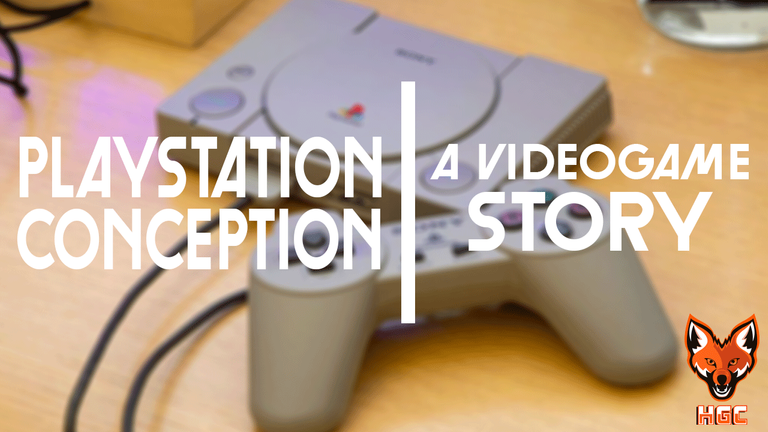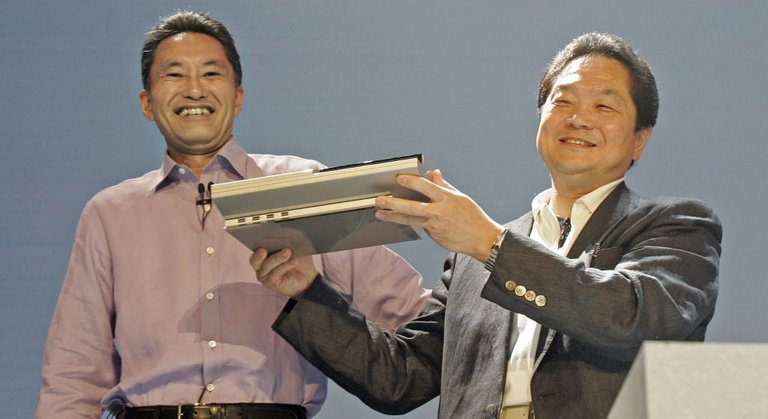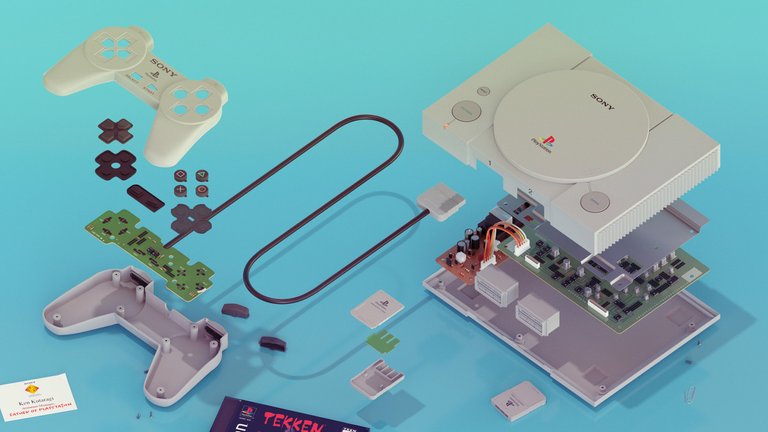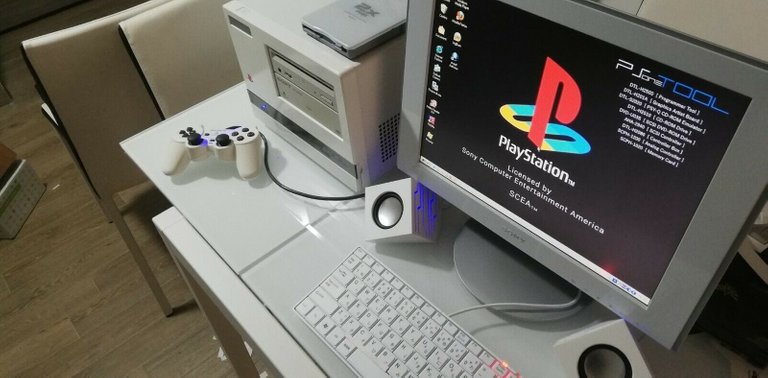
Video game history is a relatively recent development, and even today many of the companies and studios that once put the medium on the map are still making waves and releasing games today.
In the last episode we talked about Nintendo and a new possible rival on the horizon, Sony, but I think this whole story is much better understood when we transpose it to a particular individual, in the previous post it was Nintendo executives but we'll put the spotlight on Ken Kutaragi, one of Sony's chief engineers at the time.
Back in the mid-1980s, in a corner of Sony's Tokyo offices, Ken was investigating the possibility of merging consumer electronics with the world of video games. One day, during a presentation of his ideas to Sony executives, he mentioned the idea of developing a video game console in collaboration with Nintendo.

Image by shacknews
His idea was something that many people were excited about, an extension made for the Super Nintendo that would enable the possibility of playing games on CD-ROM,
Note the word CD because it was the origin and became an ace in the hole for Sony, who was one of the manufacturers of CD discs and also had the rights to charge for the manufacture of these.

Image by videogameschronicle
The CD was a revolution in multimedia not only for its higher quality and available size but also for how cheap it was for the companies, before that were the cassettes or in the case of video games the cartridges, which were also expensive and complicated to record and develop en masse, this is the point of Sony to ensure an alliance with Nintendo to generate the prototypes that we saw in the previous chapter.
However, this agreement would not prosper, partly because Sony's demands for distribution rights were not at all to the liking of a company like Nintendo, which has always wanted and had almost absolute control of everything it produces.

Image by videogameschronicle
Now I think comes the debate of the ways in which Nintendo decided to violate this agreement and how angry they were at Sony about it, so much so that the moment Kutaragi showed up at one of Sony's regular meetings with their executives to discuss options they pretty much played along when he decided something unthinkable, to compete, create his own console and improve Nintendo's policies with developers thanks to his secret weapon: The CD format.

Image by Polygon
By the time the project was approved, Kutaragi began to assemble his team of engineers and developers to form a prototype for the so-called Playstation,
Many of these developers came from two competitors in the sector, Sega and Nintendo. The 80s were behind us, where Nintendo had the Super Nintendo console, it was the time of 3D and Sony knew they could compete against Nintendo's new console, the 64.
Sony didn't have any kind of experience making consoles, and had little to nothing in anything associated with software, the first thing was solved by recruiting several ex-employees of established companies but the next thing was a little more complicated, Nintendo made their games or closely followed the development to give them their seal of quality.
And Nintendo was doing well for the most part, publishing hit after hit.
PlayStation approached this in a different way, allowing lower charges for publishing games on their console and designing the Playstation in a better way so that developers who wanted to get into their console would be as informed as possible. The most important change was undoubtedly 3D, nobody knew how to design a video game in the format that the Playstation demanded, there were some formats that simulated the third dimension but nothing like this.

Image by growngaming
Although Sony's focus was on third parties they also included the team and bought some studios to help them realise this vision, also a local studio allowed the console to launch with games already available and gave a base to other developers on how to design in this new environment, here we must also highlight the figure of Peter Molineux who became a creative flagship of the first Playstation with his games.

Image by engadget
You could say that Sony was betting on being as inclusive as possible with all types of developers, it was going to have the light adventures that you could find in a space like Nintendo but it was also going to look for the target of other companies like SEGA, teenagers and also include adults in what is for me the birth of a much more mature video game.
In the midst of all this development was always the question of whether Sony could realistically compete with a giant as hegemonic as Nintendo, Nintendo was the industry, it controlled the market in its own way and only a few companies had been able to compete with it in the console space...
But the perfect storm was approaching and video gaming was about to change.
Spanish Version

La historia del videojuego es un terreno que se ha desarrollado desde hace relativamente poco tiempo, vemos que incluso a dia de hoy muchas de las compañias y estudios que en su momento pusieron en el mapa a este medio siguen dando de que hablar y sacando juegos en la actualidad.
En el episodio anterior hablamos de Nintendo y de un nuevo posible rival en el horizonte, Sony, pero creo que toda esta historia es mucho mejor entendida cuando la trasponemos a un individuo en particular, en el post anterior fueron los ejecutivos de Nintendo pero pondremos la lupa en Ken Kutaragi, uno de los ingenieros en jefe de Sony por esos años.
A mediados de los años 80, en un rincón de las oficinas de Sony en Tokio, Ken se encontraba investigando la posibilidad de fusionar la electrónica de consumo con el mundo de los videojuegos. Un día, durante una presentación de sus ideas a los ejecutivos de Sony, mencionó la idea de desarrollar una consola de videojuegos en colaboración con Nintendo.

Image by shacknews
Su idea era algo que a muchas personas le hacia ilusion, una extension hecha para la Super Nintendo en donde habilitaria la posibilidad de jugar juegos en formato CD-ROM,
atentos a la palabra CD porque fue el origen y se convirtio en un as en la manga para Sony, que era uno de los fabricantes de discos CD y ademas tenia los derechos para cobrar sobre la manufactura de estos.

Image by videogameschronicle
El CD fue toda una revolucion en la multimedia no solo por su mayor calidad y tamaño disponible sino tambien por lo barato que le salian a las empresas, anterior a eso estaban los cassettes o en el caso de los videojuegos los cartuchos, que ademas eran caros y complicados de grabar y desarrollar en masa, este es el punto de Sony para asegurar una alianza con Nintendo generar los prototipos que vimos en el anterior capitulo.
Sin embargo ese acuerdo no prosperaria, en parte porque las exigencias de Sony con los derechos de distribucion no le gustaba para nada a una compañia como Nintendo, que siempre ha querido y tenido el control casi absoluto de todo lo que produce.

Image by videogameschronicle
Ahora creo que viene el debate de las formas en la que Nintendo decidio vulnerar este acuerdo y lo enojados que estaban en Sony con eso, tanto que en el momento en el que Kutaragi se presento a una de las reuniones habituales de Sony y sus ejecutivos para discutir opciones le siguieron bastante el juego cuando decidio algo impensable, Competir, crear su propia consola y mejorar las politicas de Nintendo con los desarrolladores gracias a su arma secreta: El formato CD

Image by Polygon
En el momento en el que el proyecto fue aprobado, Kutaragi empezo a formar su equipo de ingenieros y desarrolladores para formar un prototipo para la denominada Playstation,
muchos de estos desarrolladores venian de dos competidores del sector, Sega y Nintendo, atras quedaron los 80s en donde Nintendo tenia de consola la Super Nintendo, era el momento del 3D y en Sony sabian que podian competir contra la nueva consola de Nintendo, la 64.
Sony no tenia ningun tipo de experiencia fabricando consolas, y tenia poco a nada en algo asociado a software, lo primero se soluciono reclutando a varios ex-empleados de compañias establecidas pero lo siguiente era algo un poco mas complicado, Nintendo hacia sus juegos o seguia muy de cerca el desarrollo para darles su sello de calidad
Y a Nintendo le iba bien en su mayoria, publicando hit after hit
Playstation abordo esto de manera diferente, permitiendo menores cobros por publicar videojuegos en su consola y diseñando de mejor forma la Playstation para que los desarrolladores que quisieran entrar en su consola lo mas informados posibles. El cambio mas importante era sin duda el 3D, nadie sabia como diseñar un videojuego en el formato que pedia la Playstation, habian algunos formatos que simulaban la tercera dimension pero nada como esto.

Image by growngaming
Aunque el enfoque de Sony estaba en los third partys tambien incluyeron al equipo y compraron algunos estudios para ayudarles a hacer realidad esta vision, tambien un estudio local permitia a la consola lanzarse con juegos ya disponibles y le daba una base a otros desarrolladores de como diseñar en este nuevo ambiente, aqui tambien hay que destacar la figura de Peter Molineux que se convirtio en un creativo insignia de la primera Playstation con sus juegos.

Image by engadget
Se podria decir que Sony le apostaba a ser lo mas inclusiva posible con todo tipo de desarrolladores, iba a tener las aventuras ligeras que se podrian encontrar en un espacio como Nintendo pero tambien iba a buscar el target de otras compañias como SEGA, los adolescentes y ademas incluir tambien a los adultos en lo que es para mi el nacimiento de un videojuego mucho mas maduro
En el medio de todo este entramado de desarrollo siempre estuvo la duda de si Sony podia realisticamente hacerle competencia a un gigante tan hegemonico como Nintendo, Nintendo era la industria, controlaba el mercado a su manera y solo algunas compañias habian podido enfrentarlo en el espacio de las consolas...
Pero la tormenta perfecta se acercaba y el videojuego iba a cambiar
Meh, al día de hoy Nintendo sigue controlando el mercado y las ventas hablan por si solas, PlayStation solo compite con la Xbox (aunque esta última esté casi moribunda sobreviviendo a base del cloud gaming) y nada más. Es lo que se tiene ser el primero en algo y saber mantenerse.
no controlan ya un pedazo del pastel que era el punto de sony desde el comienzo, agarrarse un poco de la industria para ellos
psx really took the world by storm and I think what kept it alive for so long and turned into a lifestyle is the modding/piracy community. like everybody I knew had a modded PSX.
I lived the same but with the ps2 I didn't know anyone who had original games from that console they were all downloaded online
This was an entertaining read! You kept it short and neat while still holding attention to what was to come. Great job!
thank you for your words, I try to keep it short but tell the story of its actors